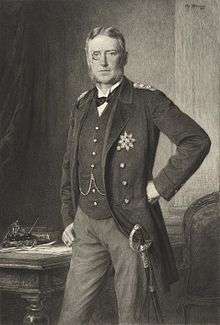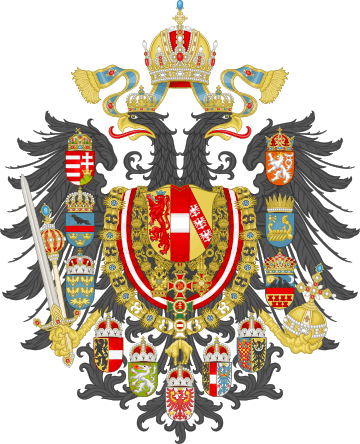Franz, Prince of Thun and Hohenstein
Prince Franz Anton von Thun und Hohenstein, Czech: kníže František Antonín z Thunu a Hohensteina (2 September 1847, Děčín, Bohemia – 1 November 1916, Děčín, Bohemia) was an Austro-Hungarian noble and statesman.
Franz Anton Fürst von Thun und Hohenstein | |
|---|---|
 Franz, Prince of Thun and Hohenstein (1893) | |
| 15th Minister-President of Cisleithania | |
| In office 5 March 1898 – 2 October 1899 | |
| Monarch | Franz Joseph I |
| Preceded by | Paul Gautsch Feirherr von Frankenthurn |
| Succeeded by | Manfred Graf von Clary-und-Aldringen |
| Personal details | |
| Born | 2 September 1847 Děčín, Kingdom of Bohemia Austrian Empire |
| Died | 1 November 1916 (aged 69) Děčín, Kingdom of Bohemia Austria-Hungary |
He served as the Habsburg monarchy's Governor of his native Bohemia from 1889 to 1896 and again from 1911 to 1915. He was also briefly the 15th Minister-President of Austria and Minister of the Interior from 1898 to 1899.
Biography
Like most of the rest of the Thun und Hohenstein family, he belonged to the Federalist party, and his appointment in 1889 as governor of Bohemia was the cause of grave dissatisfaction to the German Austrians. He took a leading part in the negotiation of 1890 for the Bohemian settlement, but the elections of 1891, in which the Young Czechs who were opposed to the feudal party gained a decisive victory, made his position a very difficult one. Contrary to expectation, he showed great energy in suppressing disorder; but after the proclamation of a state of siege his position became untenable, and in 1895 he had to resign. On the resignation of Badeni in 1898 he was made minister president, an office which he held for little more than a year. Although he succeeded in bringing to a conclusion the negotiations with Hungary, the support he gave to the Czechs and Slovenians increased the opposition of the Germans to such a degree that parliamentary government became impossible, and at the end of 1899 he was dismissed.
His sympathy towards the Czech people was responsible for a minor diplomatic spat between Austria-Hungary and the German Empire when the Prussian government deported some of its migrant Czech and Polish workers in 1899. The incident was part of an overall cooling of relations between the two empires at the end of the 19th century.[1]
Personal life
Franz was firstly married in Prague to Princess Anna Maria Gabriela zu Schwarzenberg (1854-1898) in 1874. The marriage was childless. He married for the second time in 1901. to his distant cousin, Countess Ernestine Gabriele von Thun und Hohenstein (1858-1948), widow of Count Eugen Wratislaw of Mitrovic (1855-1897). They had one daughter, Countess Anna Maria Wilhelmine (1903-1943), who married her first cousin once removed, Baron Wolfgang von Thienen-Adlerflycht (1896-1942) and got Castle Neuhaus near Salzburg as a wedding present.
Title of Prince
He was raised to Princely rank by Emperor Franz Joseph I of Austria on 19 July 1911. As he had only one daughter, upon his death in 1916 the Princely title was inherited by his brother, Prince Jaroslav von Thun und Hohenstein (1864-1929), uncle and legal guardian of Hohenbergs, children of murdered Archduke Franz Ferdinand of Austria and Sophie, Duchess of Hohenberg, who was sister of Jaroslav's wife Countess Maria Pia Chotek von Wognin.
References
- F. R. Bridge, The Habsburg Monarchy Among the Great Powers, 1815-1918. Pg. 237, 412.
